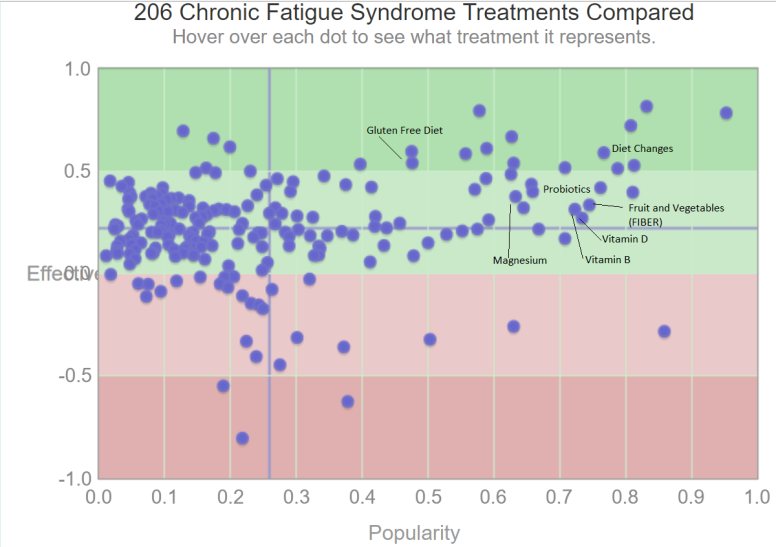In my last post, I gave a Cookbook based on PubMed articles and some surveys on this site. CFS patients often ask on support groups — what to take, and the quality of recommendations vary greatly! The ideal response or guidance for any supplement, probiotics or anti-infection agents would be:
- Probability of improvement
- Degree of improvement is often very subjective
- Probability of problems / deterioration
- Quantity taken (many pubmed studies have no effect seen until a certain dosage was reached)
IN this post I will list survey sites that I found and list items that were not included in the Cookbook or the Surveys. Items need at least 10 responses in the survey to be included
- ME Association of UK 2010 Survey:
- CORTICOSTEROID eg HYDROCORTISONE: Better 33% Worst 21.6%
- THYROXINE: Better 41% Worst 10.8%
- MODAFINIL/PROVIGIL: Better 37% Worst 29.6%
- EICOSAPENTAENOIC AID (EPA) OMEGA 3 OIL: Better 36.3% Worst 4%
- L CARNITINE: Better 30.8% Worst 6.3%
- INOSINE PRANOBEX/ IMUNOVIR: Better 25.8% Worst 24.2%
- Enada/NADH: Better 19.9% Worst 16.8%
- EVENING PRIMROSE OIL: Better 28.4% Worst 5.4%
- https://beta.groups.yahoo.com/neo/groups/CFSFMExperimental/polls/close
- EDTA (thylenediaminetetraacetic acid): 32.5% improved 12% worst
- my experience with getting a saline drip has been (short term): Better 72% Worst 0%
- low dosage naltrexone http://www.lowdosenaltrexone.org): Better 26% Worst 26%
- ImmunoPro (non-denatured whey): Better: 47% Worst 24%
- Alfred Blasi protocol (http://health.groups.yahoo.com/group/Al fredblasiprotocolFMSCFS/ ): Better: 46% Worst: 11%
- Salt/C Protocol (http: http://www.lymephotos.com): Better 36% Worst: 12%
- Gookinaid: Better: 54% Worst: 46%
- the Hemex Protocol (anticoagulants, ISAC panel Mocha Panel): Better: 48% Worst: 27%
- Cholestyramine: Better: 58% Worst: 8%
- http://www.storiesoutloud.co.uk/supplements/pollresultsall.py
- Coconut Oil: Better: 81% Worst: 6%
- Probiotics (not specific): Better: 69% Worst: 0%
- Vitamins
- B Vitamins: Better: 69% Worst 0%
- B12: Better 59%, Worst 5%
- Folic Acid or Methylfolate: Better 40% Worst 15%
- NADH: Better 27%, Worst 9%
- Vitamin C: Better: 66% Worst 0%
- Vitamin D: Better 54%, Worst 14%
- B Vitamins: Better: 69% Worst 0%
- Minerals
- Magnesium (Not Epsom Salts): Better: 74% Worst 6%
- Epsom Salts (Magnesium Sulfate): Better: 92% Worst 0%
- Calcium: Better 25%, Worst 17%
- Sea Salt: Better: 83% Worst 0%
- Selenium: Better 60%,Worst 10%
- Zinc: Better 56%, Worst 6%
- Digestive Enzymes: Better: 55% Worst 6%
- Garlic: Better: 50%, Worst 0%
- Turmeric/Curcumin: Better 60%, Worst 7%
- Dehydroepiandrosterone (DHEA): Better 60% ,Worst 10%
- Omega 3 (No Particular Oil): Better 47%, Worst 0%
- N-Acetyl-L-Cysteine (NAC): Better 60%, Worst 13%
- Spirulina: Better 40% , Worst 0%
- Co-enzyme Q10 or Ubiquinol: Better 55%, Worst 19%
- Melatonin: Better 56%, Worst 20%
- Acetyl-L-Carnitine (ALC): Better 48%,Worst 9%
- D-Ribose: Better 51% , Worst 18%
- Evening Primrose Oil: Better 38%, Worst 8%
- Ginkgo: Better 45% , Worst 18%
- Milk Thistle: Better 46% , Worst 23%
- Valerian: Better 64% , Worst 29%
- Chocolate or Cocoa: Better 48% , Worst 24%
- Ginseng (American or Asian/Korean/Panax or Siberian): Better 25%, Worst 8%
- 5-HTP: Better 33% , Worst 40%
- Echinacea: Better 6%, Worst 25%
- http://curetogether.com/Chronic-Fatigue-Syndrome/survey/treatments/ (Associated with 23andMe.com — DNA). The details are not available so we cannot get the same odds ratio as above easily, I did items on the top of the list for effectiveness
- Low-Dose Naltrexone: Better 62% Worst 11%
- Recuperation (Mineral-rehydration supplement): Better 53% Worst 7%
- B12 Injections: Better 47% Worst 8%
- Far Infrared Heat (Migun Bed): Better 53% Worst 10%
- Thyroid hormone: Better 47% , Worst 10%
- Probiotics (not specific): Better 42% , Worst 6%
- Magnesium (Oral): Better 40% Worst 5%
- Chelation Treatments: Better 46% Worst 6%
- Eat more vegetables and fruits (Increase natural fiber): Better 34% Worst 4%
- Chonazepan (Klonopin, Rivotril): Better 51% Worst 19%
- Diflucan (Antifungal): Better 33% Worst 3%

Bottom Line
If you know of additional surveys/polls please pass their URL along.
A lot of items are sitting around 50% for helping… so the first choice should be items with a low percentage of harming (i.e. 10% or less…) and at least a 50% for helping.. This gives a 5:1 risk factor. The top picks from above are:
- Zero risk of worst
- Saline Drip – usually not practical
- Sea Salt
- Magnesium Sulfate
- Probiotics (any)
- Vitamin C
- High benefit to risk ratio ( with > 50% of being better)
- 13.5 Coconut Oil
- 12 B12
- 8.6 Turmeric/Curcumin:
- 7.25 Cholestyramine:
- 7 Zinc
- 6 Selenium
- 6 Dehydroepiandrosterone (DHEA):
Dosages? Most of the surveys do not say anything about dosages. I know a few dosages from studies, cited in this post. My rule of thumb is that the dosage on bottles are not-therapeutic dosages, and do not consider mal-absorption seen in CFS/FM/IBS. Take vitamin B1 (thiamine) as an example: This 2013 study found no improvement below 1500 mg/day and then a major improvement. The typical B1 dosage is:
- “For adults with somewhat low levels of thiamine in their body (mild thiamine deficiency): the usual dose of thiamine is 5-30 mg daily in either a single dose or divided doses for one month. The typical dose for severe deficiency can be up to 300 mg per day.” [MedLinePlus.Gov]
IMHO, malabsorption is a major major factor — resulting in effective dosages being much higher than is normally accepted.
